题目内容
I live in Japan, where electronic items are a way of life, so it is no surprise that many students carry these little electronic dictionaries. Think of it. That huge, heavy paper dictionary that you used to see in your library looked like a building block in size and weight, yet someone has found a way to change all of that into a plastic box smaller than a video cassette tape.
E-dictionaries may be lighter and compacter(简洁的) than any paper dictionary. They may even contain more words and expressions. It depends on which one you buy. To me, these are pretty much the limits to their advantages.
I think e-dictionaries should be limited in their use in classrooms. Let's take a look at some reasons.
E-dictionaries are much more expensive. In Japan, they cost as little as 10,000 yen (US$100) or as much as 40,000 yen, depending on how many functions you want (or think you want) and depending on how fashionable you are. My trusty Random House paper dictionary is copyrighted in 1995, cost me a mere US$12.95 plus tax.
E-dictionaries are more fragile. Drop your paper dictionary. Go ahead. Hold it above your head and drop it. Now, try this with any lightweight plastic e-dictionary, and you'll be picking up the pieces.
E-dictionaries need batteries. Batteries are temperature sensitive. Batteries cost money, no, make that extra money.
E-dictionaries have keypads. Typing in the spelling of a word is harder and more time-consuming(耗时)than looking through pages and using the index at the top of each page.
Let me add a statement about one that really troubles me. Sound. Little devices beep(嘟嘟声)when you press the buttons, but it is very disturbing to some people in a classroom situation or library.
Finally, let's consider making corrections or additions. No dictionary is perfect, paper version or electronic. However, when you find something you'd like to change in the e-dictionary, you can't do anything about it. You can pencil in some notes with the paper type. Similarly, if you learn a word that isn't in the dictionary, a few notes of a pencil make it easy to increase its memory capacity. Not possible with a keypad model. And, for those students whose habit is to mark certain words with a highlight pen for case of future reference, again, the paper dictionary wins out.
9. What's the main idea of the text?
A. The advantages and disadvantages of e-dictionaries from the author's point of view.
B. Electronic items are a way of life in Japan.
C. It's fashionable to carry little e-dictionaries.
D. The bad effect of using e-dictionaries on students and teachers.
10. How many disadvantages does the author address in the text?
A. 4. B. 6. C. 8. D. 10.
11. What does the author hate most of all the disadvantages?
A. Not possible to make additions.
B. Wasting more time looking up words.
C. Too expensive to buy e-dictionaries and batteries.
D. Making sound when pressing the buttons.
12. What is the greatest advantage of the paper dictionary compared with the e-dictionary?
A. Containing more words and expressions.
B. More light and compact to carry.
C. Making corrections or additions for future reference.
D. Costing less money.
9. A。本文的中心是作者对"电子词典优缺点"的看法。10. B 11. D。倒数第二段即本题答案出处。12. C。最后一段即本题答案出处。

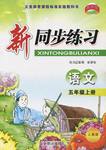 教学练新同步练习系列答案
教学练新同步练习系列答案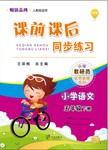 课前课后同步练习系列答案
课前课后同步练习系列答案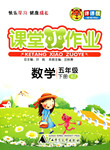 课堂小作业系列答案
课堂小作业系列答案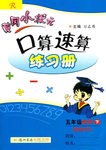 黄冈小状元口算速算练习册系列答案
黄冈小状元口算速算练习册系列答案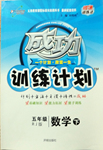 成功训练计划系列答案
成功训练计划系列答案 倍速训练法直通中考考点系列答案
倍速训练法直通中考考点系列答案I grew up in a house where the TV was seldom turned on and with one wall in my bedroom entirely lined with bookshelves, most of my childhood was spent on books I could get hold of. In fact, I grew up thinking of reading as natural as breathing and books unbelievably powerful in shaping perspectives(观点)by creating worlds we could step into, take part in and live in.
With this unshakable belief, I, at fourteen, decided to become a writer. Here too, reading became useful. Every writer starts off knowing that he has something to say, but being unable to find the right ways to say it. He has to find his own voice by reading widely and discovering which parts of the writers he agrees or disagrees with, or agrees with so strongly that it reshapes his own world. He cannot write without loving to read, because only through reading other people’s writing can one discover what works, what doesn’t and, in the end, together with lots of practice, what voice he has.
Now I am in college, and have come to realize how important it is to read fiction. As a law student, my reading is in fact limited to subject matter — the volume(量)of what I have to read for classes every week means there is little time to read anything else. Such reading made it all the clearer to me that I live in a very small part in this great place called life. Reading fiction reminds me that there is life beyond my own. It allows me to travel across the high seas and along the Silk Road, all from the comfort of my own armchair, to experience, though secondhand, exciting experiences that I wouldn’t necessarily be able to have in my lifetime.
【小题1】What can be inferred about the author as a child?
| A.He never watched TV. |
| B.He read what he had to. |
| C.He found reading unbelievable. |
| D.He considered reading part of his life. |
| A.the ability to speak |
| B.a way of writing |
| C.a sound quality |
| D.a world to write about |
| A.It opens up a wider world for him. |
| B.It helps him to realize his dream. |
| C.It makes his college life more interesting. |
| D.It increases his interest in worldwide travel. |
| A.How do I read? | B.What do I read? | C.Why do I read? | D.When do I read? |
Steven Jobs, the designer of Apple Computer, was not clever when he was in school. At that time, he was not a good student and he always made troubles with his schoolmates. When he went into college, he didn’t change a lot. Then he dropped out(退学). But he was full of new ideas.
After he left college, Steven Jobs worked as a video game designer. He worked there for only several months and then he went to India. He hoped that the trip would give him some new ideas and give him a change in his life.
Steven Jobs lived on a farm in California for a year after he returned from India.
In 1975, he began to make a new type of computer. He designed the Apple Computer with his friend in his garage. He chose the name “Apple” just because it could help him to remember a happy summer he once spent in an apple tree garden.
His Apple Computer was so successful that Steven Jobs soon became famous all over the world.
He often said, “I live in order to change the world, there aren’t any other reasons. The only way to have a great achievement is to love your own career. If you can’t find your favorite career, go on looking for it and never give up.”
This is Steven Jobs, though he is dead, his spirit and achievements still influence our lives.
【小题1】Steven Jobs was not a good student in school because he ________.
| A.never did his lessons | B.dropped out |
| C.always made troubles with his schoolmates | D.he was full of new ideas |
| A.Because he wanted to be a video game designer. |
| B.Because he wanted to get some new ideas. |
| C.Because he wanted to make a new type of computer. |
| D.Because he wanted to have a happy summer. |
| A.new ideas | B.Apple Computer | C.video games | D.saying |
| A.didn’t finish his studies in the college because he hated his schoolmates |
| B.liked traveling in India and California |
| C.liked trying new things and making his new ideas come true |
| D.thought he had many reasons to live in the world |
| A.The only way to have a great achievement is to love your career. |
| B.The name “Apple” helped Jobs to remember a happy summer in an apple tree garden. |
| C.If you can’t find the career you love, give it up and try another one. |
| D.People remember Jobs because of his achievements. |
I live in a very over populated beach area in the Los Angeles, and I love the beautiful scenery! But because of many people, lots of things are easy to be out of order, and sometimes it’s also easy to lose your cool. Today was a day I wish I did not get out of bed. I mean that if I did not have to wake up and deal with all the things that I deal with on a daily basis, it would have been wonderful.
I had a cup of coffee this morning and that was my meal for breakfast, not healthy I know. Anyway, my stomach was sounding like a truck. So, I jumped in my car and decided to buy some food.
I was in line at Taco Bell (一家墨西哥速食店) and the line was like a long snake! Finally I got to place my order, but a young girl in nice clothes pulled in and was stuck in such a way that unless I moved for her, she wouldn’t be able to get out. So I backed up and waved her into my place in the front of the line.
To my surprise, this young girl did not say thanks. I was cool with it because I thought that I had done something nice for a change. After the girl received her food and pulled away, I pulled into the ordering spot, not mad, but hungry, and the employee said, “Hi, that girl just paid for your food.”
That food was the most satisfying nourishment (营养品) my body had ever taken! If just by chance you are that person who bought my food, I should say “Thank you!”
【小题1】The underlined part in the first paragraph probably means “_____”.
| A.be friendly to others | B.become angry |
| C.get warmer | D.remain calm |
| A.He remained lying in bed all the morning. |
| B.He didn’t feel well after drinking a cup of coffee. |
| C.He made room for a girl who jumped the queue. |
| D.He had a quarrel with a girl who didn’t stand in line. |
| A.She got out of her car and said thanks. |
| B.She drove away with her own food. |
| C.She received her food and waved goodbye. |
| D.She paid for the author’s food without him knowing. |
| A.Kindness is spreading |
| B.Being patient wins respect |
| C.Being calm is important in accidents |
| D.Being polite can change the world |
Recently, I experienced a wonderful lesson in how little things still mean a lot. My brother, mother and I live in a very rural district on the Big Island of Hawaii. Our farm is at least a dozen miles from the most basic of services. Consequently, we take weekly trips to COSTCO to procure fuel and supplies. About a month ago, we’d finished loading up the SUV and prepared to leave. As I settled into my seat, I glanced down at the roadside, when a piece of paper caught my eye. I picked it up and read it carefully. Instantly, I was grateful I did.
The form turned out to be a receipt from the State Motor Vehicle Division, documenting the owners’ payment of their Vehicle’s Registration fees. Quickly, I put myself in their shoes and figured: no one would throw this out, especially if it was current. I also looked over the form for contact or any personal data, perhaps a license tag or telephone number. But that seemed impractical. Although the form had been born on the wind, where in the busy, crowded parking lot would I find the owners? Had it been lying there for a few minutes or a week? So I checked the date, the fees paid, noted the names of the owners and pocketed the receipt. Recalling the parable of the Good Samaritan, I concluded that the best and easiest step to take was to put the form in an envelope addressed to the couple and send it to them by post. Further, I imagined how crazy I’d be if I had misplaced my receipt. Much easier to attempt returning it than to leave them angry, upset, etc. over the loss.
By the end of the week, I received a beautiful thank-you letter from a very grateful and happy couple containing a hand written message and a gift card to use at any Starbuck’s. In her note, the wife explained how a gust of wind snatched their receipt from a pocket in her car’s passenger door. They had panicked and searched crazily for quite some time before giving up. It felt great to know I’d helped someone avoid a major loss by doing something that at first glance seemed minor or even unimportant.
【小题1】What did the author really mean when he said “Instantly, I was grateful I did.”?
| A.He was lucky to notice the paper on the roadside. |
| B.He was happy to do shopping in the district for it was convenient. |
| C.He was right to pick the paper up because it was important. |
| D.He was thankful to pick up the paper because he found it for a long time. |
| A.I rode my car to COSTCO to buy supplies a month ago. |
| B.The receipt was out of date, so the owner threw it away. |
| C.I waited on the roadside for the receipt owner for half a day. |
| D.I called up the owner to take back the receipt. |
| A.it was useless for him |
| B.he knew the owner was upset about losing it |
| C.the owner asked him to do so |
| D.he knew the owner would reward him for it |
| A.How I helped the couple | B.The loss of an important receipt |
| C.The owner of the receipt | D.Little things still mean a lot |